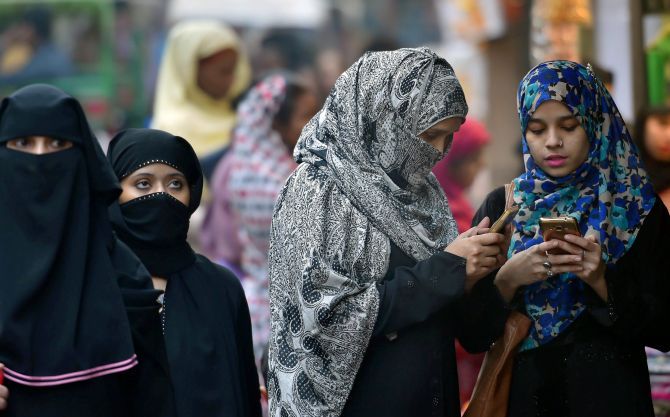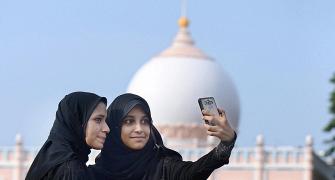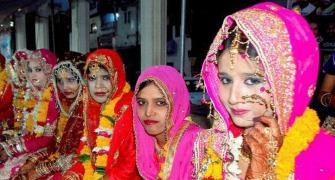
Nearly seven months after banning the practice of ‘triple talaq’, the Supreme Court on Monday decided to examine the constitutional validity of prevalent practices of polygamy and ‘nikah halala’ among the Muslims.
The top court issued notices to Union ministries of law and justice and minority affairs as well as the National Commission of Women after taking note of the plea of Delhi-based woman Nafisa Khan challenging the practice of polygamy and ‘nikah halala’, and said that the matter will be taken up a five-judge Constitution bench.
“Issue notice to the respondents in WP....of 2018. We have said so, as they are the real parties who can take a stand and assist the court.
“We may further state, in other writ petitions, the Law Commission of India has been made a party. Since we do not think that the Law Commission of India should be made a respondent, we have confined issuance of notice to the parties which have been arrayed as respondents in this writ petition,” a bench of Chief Justice Dipak Misra and justices A M Khanwilkar and D Y Chandrachud.
The bench was referring to the other three pleas on the same issue in which Law Commission was made one of the parties by the petitioners.
The bench considered the submission that an earlier five-judge constitution bench, in its 2017 verdict, had kept open the issue of polygamy and ‘nikah halala’ while quashing triple talaq.
It took note of the submissions of senior lawyers Mohan Parasaran, V Shekhar, Sajan Poovayya, appearing for various petitioners, that the instant matter be also referred to a five-judge Constitution bench.
“At this juncture, a submission has been advanced at the Bar that keeping in view the importance of the issue, the matter should be placed before the Constitution Bench.
“Accepting the said submission, it is directed that the matter be placed before Hon’ble the Chief Justice of India for constitution of appropriate Constitution Bench for
dwelling upon the issues which may arise for consideration from the writ petitions,” it said.
The court directed that the copy of the plea be sent to the office of Attorney General K K Venugopal.
Parasaran said that the pleas pertained to prevalent practice of polygamy including ‘nikah halala’, ‘nikah mutah’ and nikah misyar and submitted that they are unconstitutional.
While polygamy allows a Muslim man to have four wives, ‘nikah halala’ deals with the process in which a Muslim woman, who wants to remarry her husband after divorce, has to first marry another person and get divorce from him after consummation.
‘Nikah mutah’ and ‘nikah misyar’ are both temporary marriages where duration of the relationship is specified and agreed upon in advance.
Parasaran said that these practices though come within the domain of personal law, are not immune from judicial review under the Constitution.
Referring to the ‘triple talaq’ judgment, the lawyer said that the said issues, raised in the fresh pleas, were not addressed to.
By a majority of 3:2, a five-judge constitution bench, on August 22 last year, had banned the 1,400 year-old practice of instant ‘triple talaq’ among Sunni Muslims and set it aside on several grounds including that it was against the basic tenets of the Holy Quran and violated the Islamic law Shariat.
Monday, the bench was hearing as many as four petitions including a PIL challenging the practices on various grounds including that they violate Right to Equality and gender justice.
The apex court, however, issued notice on the plea filed by Delhi-based woman Nafisa Khan.
On March 14, Khan had moved the apex court saying that by virtue of Muslim Personal Law, section 494 of IPC (marrying again during lifetime of husband or wife) was rendered inapplicable to this community and no married Muslim woman has the avenue of filing a complaint against her husband for the offence of bigamy.
She sought to declare the Dissolution of Muslim Marriages Act, 1939, unconstitutional and violative of Articles 14, 15, 21 and 25 (freedom of conscience and free profession, practice and propagation of religion) of the Constitution in so far as it fails to secure for Indian Muslim women the protection from bigamy which has been statutorily secured for women in India belonging to other religions.
The petitioner, who herself claimed to be a victim of such practices, has alleged that her husband and his family used to torture her for dowry and she was ousted from the matrimonial home twice.
She also alleged that her husband had married another woman without taking any legal divorce from her and the police had refused to lodge FIR under section 494 and 498A (husband or relative of husband of a woman subjecting her to cruelty) of the IPC stating that polygamy was permitted under the Sharia.
The top court also allowed Muslim Women Resistance Committee, Kolkata to file an application for impleadment as a party in the hearing.
Delhi Bharatiya Janata Party leader Aswini Kumar Upadhyay, who filed a PIL on March 5, claimed that the ban on polygamy and ‘nikah-halala’ was the need of the hour to secure basic rights.










